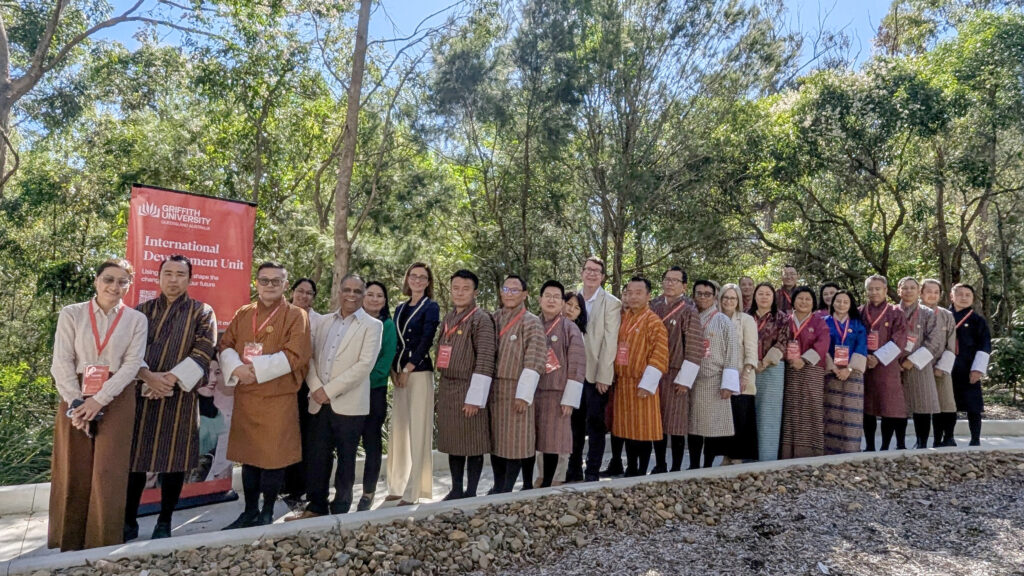Project Description
The Australia Awards Short Course acknowledges Bhutan as a unique country, guided by its strong cultural principles and focus on national happiness, in addition to sustainable economic development and prosperity. The course was designed to align with the Government of Bhutan’s Thirteenth Five Year Plan and its priorities of developing into a high-performing Gross National Happiness (GNH) economy with a robust and resilient civil service. A core component of the program focused on developing leadership capabilities for Bhutan’s civil servants, ensuring they not only have the fundamental skills in policy formulation, design and implementation, but can disseminate these skills to the next generation of Bhutan’s government leaders.
The course facilitated active learning through interactive classroom sessions and panel presentations, on-site policy briefings and visits, and thought-provoking workshop discussions and masterclasses, with ample time for input and reflection. Specialist presenters and facilitators included senior academics, government leaders and public service practitioners and participants were encouraged to engage deeply with these experts in order to take major learnings back into their own workplaces and achieve deeper systemic development objectives.
Each participant brought with them a unique combination of policy implementation experience, strategic oversight, and sector-specific expertise. The diversity enabled rich dialogue around shared challenges and innovative solutions in public sector leadership and policymaking. Throughout the course, participants consistently demonstrated strong commitment and active participation, both collectively and individually, collaborated effectively in group tasks and provided mutual support during the sessions. Site visits and guest presentations provided participants the opportunity to actively engage in discussions with representatives providing a mutual exchange of ideas, experiences and cultural insights.

Project Personnel and Beneficiaries
There were 20 participants in this cohort composed primarily of senior government officials and council representatives from Bhutan, many of whom occupy high-level leadership and policy advisory roles. This diverse mix of expertise and professional backgrounds significantly enriched the learning environment, promoting in-depth discussions and the sharing of varied perspectives.
The participant group represented a broad spectrum of director-level roles across various sectors within the Bhutanese government, including Directors of Planning and Policy, Department Heads of Public Services and Governance, Senior Advisors in Health, Education, Environment, and Economic Development, Regional Directors and Sectoral Coordinators and Council Leaders with mandates in local governance, innovation, and infrastructure.
Outcomes to Date
Participants completed a return-to-work projects (RWPs) as part of the short course. The RWPs were of high strategic value to the government and people of Bhutan with topics reflecting the diversity of policy challenges from energy policy and pricing framework to attraction and retention of talent in public service.
Some of the impressive projects included designing a rationalized domestic electricity pricing framework aligned with the national Energy Policy, studying the health financing system and drawing policy recommendations to strengthen health financing system in Bhutan, and a feasibility study on improving accommodation standards for Foreign Workers in Construction.
By fostering inter-agency collaboration and building technical capacity at both the organizational and national levels, the course has laid a strong foundation for evidence-based policymaking and long-term development planning.
Project Significance
The Australia Awards Short Course supported participants to enhance leadership and decision-making capabilities to ensure they are better equipped to address Bhutan’s complex and emerging policy challenges, including in areas of climate change, access to energy, healthcare services and education in rural and remote communities, youth unemployment, and economic vulnerabilities. The course was designed to address these local challenges by exploring policy frameworks across sectors, including energy and environment, tourism, education, health, human resources and workforce development, linking all the learning back to the policy cycle. Learning topics of the course covered key themes including, the policy cycle, formulation, analysis and design; engagement and consultation; and policy implementation, monitoring and evaluation of leadership in the public sector and gender equality, disability, and social inclusion principles.
While the course was underpinned by essential theory appropriately contextualised for Bhutan’s unique cultural heritage, governmental priorities, and technological landscape, it also moved beyond theory and demonstrated how theory is often not reflective of reality when exploring the context and circumstances surrounding complex policy issues.

